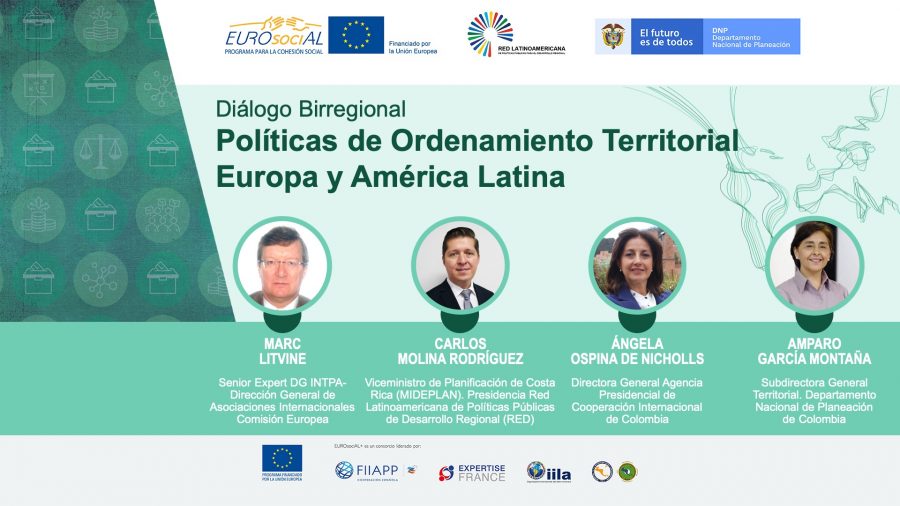Authorities from Colombia, El Salvador, Argentina, Chile, Peru, Portugal, Spain, France and Germany participate in the “Bi-regional Dialogue: Territorial Planning Policies Europe and Latin America” which discussed how compliance with the 2030 Agenda can be achieved in the territories during COVID.

Land Management policies, both in Europe and Latin America, are key to consolidating the objectives of the 2030 Agenda. For this reason, and with the aim of sharing experiences that allow the addressing of policies to reduce the territorial divide within countries, the National Planning Department of Colombia, the Latin American Network of Public Policies for Regional Development and the European Union’s EUROsociAL+ programme have organised the “Bi-regional Dialogue: Territorial Planning Policies Europe and Latin America”, where lessons have been exchanged regarding the challenges of sustainable development and economic and social recovery from a national, subregional and cross-border perspective.
Ministerial authorities from Colombia, El Salvador, Argentina, Chile, Peru, Portugal, Spain, France, Germany, will share some of the progress and challenges posed by land use planning to address the management and handling of protected areas, adaptation to climate change, disaster risk management, balanced development of human settlements, coverage of public services, large infrastructure projects, protection of areas of historical and cultural importance, land security issues, and harmonisation of long-term productive economic stakes, among other aspects.
The event is based on an analysis of the institutional systems of land management and regional planning of ten Latin American countries developed by the European Union programme, EUROsociAL+ in collaboration with the Latin American Network of Public Policies for Regional Development. The subject is of great importance since land use planning is a planning and management instrument that enables the correction of territorial imbalances, considering the territories’ social, economic and environmental factors.
The assistant Territorial Director General of the National Planning Department, Amparo García Montaña, said that Territorial Planning Policies, both in Europe and Latin America are key to the consolidation of the 2030 Agenda Sustainable Development Goals, because if the SDGs are not met at the local level, they will be difficult to meet at the national level.
“The effects of the COVID-19 pandemic created an unprecedented opportunity to reflect and propose innovative solutions in human settlement systems and their functional relationships, in density and land use patterns, and in the habitability conditions of urban centres and rural areas”, stated García Montaña.
The assistant Territorial Director General of the DNP added that these exercises in reflection are of great importance, since land management is a planning and management instrument that enables the correction of sub-national imbalances considering social, economic and environmental factors.
For his part, the Deputy Minister of National Planning and Economic Policy of Costa Rica, Carlos Molina, president of the Latin American Network of Public Policies for Regional Development, said that the forum “enables a unique space for dialogue and the collective construction of knowledge, starting from the lessons learnt from countries of the region. This acquires particular importance when facing a post-pandemic world, which demands clear and decisive lines of action to achieve land management and sustainable development as indicated in the 2030 Agenda”.
For his part, Marc Litvine, Senior Expert on the Directorate General for International Associations European Commission (INTPA, in its English acronym) explained that the EUROsociAL Programme, a programme oriented to promote social cohesion in Latin America “is assisting countries in the region to reduce their territorial imbalances, supporting public policies that not only adequately respond to the difficulties of the territories, but also take advantage of and maximise their potential”.
In particular, he underlined the value of this Forum for sharing different European and Latin American experiences, since the European experience “with its successes and errors, and its rich diversity with federal, regionalised or unitary states, may be a good source from which to draw some lessons learnt”. He also highlighted the importance of continuing to move forward in planning territory with a gender perspective “identifying the impact that certain public policies can generate on the situation in which men and women find themselves”.
For Colombia, this dialogue also signified a decisive step in the installation of the General Policy of Territorial Organisation in the Latin American regional context, an event that provides opportunities to promote its progress and to review shared territorial realities.



